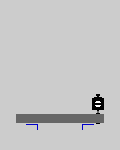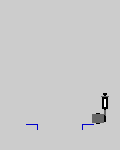Updated 981016
This page describes signal types not being standard after 1935:
Disc Signals
Semaphore Signals
Mechanical Symbol Signals
A disc signal has the same appearance to both directions of travel.
Although officially retired by 1958, disc signals could be found at private secondary lines until around 1970.
![]()
The turnout is set for the straight (non-diverging) track.
![]()
![]()
The turnout is set for the diverging track.
Blue light indicated a catch turnout in derailing/protecting position. This version of the signal was retired no later than 1935.
For movements against a facing turnout, the arm points to the right as shown in the pictures below. For the opposite direction of travel, the arm points to the left.

The turnout is set for the straight (non-diverging) track.


The turnout is set for the diverging track.
Blue light indicated a catch turnout in derailing/protecting position. This version of the signal was retired no later than 1935.

The turnout is not set. If the arm points to the right: Stop.


Viewed from the ferry
Viewed towards the ferry
2-position ferry turnout: The turnout is set for the right track (as viewed from the ferry).


Viewed from the ferry
Viewed towards the ferry
2-position ferry turnout: The turnout is set for the left track (as viewed from the ferry).


Viewed from the ferry
Viewed towards the ferry
The turnout is not set.
![]()
The turnout is set for the straight (non-diverging) track. The signal has the same appearance to both directions of travel.
1935, this signal was continued as no. 20.
![]()
The signal indicates
- a facing catch turnout in derailing/protecting position, or
- a trailing catch turnout in derailing/protecting position, or
- a derail in derailing position.
This signal was not used for facing turnouts in main tracks.
1935, this signal was named Track inaccessible (danish: Sporet spærret) and was gradually replaced by no. 24.
![]()
![]()
The facing turnout is set for the diverging track as indicated by the arrow.
After 1935, this signal was gradually replaced by no. 21.
![]()
![]()
1903-1913: The facing catch turnout is in derailing/protecting position, diverging as indicated.
1913-1935: The facing catch turnout of a main track is in derailing/protecting position, diverging as indicated.
1935, this signal was replaced by no. 23.
![]()
The trailing turnout is set for the diverging track. Further, the turnout number is indicated.
After 1935, this signal was gradually replaced by no. 22a-b.
![]()
The trailing catch turnout of a main track is in derailing/protecting position. Further, the turnout number is indicated.
1935, this signal was replaced by no. 20 or no. 22a as appropriate.

The track behind the signal is inaccesible because of a barring device in barring position.
The signal was also used to indicate unmovable buffer-stops.
1935, this signal was continued as no. 24.

The track behind the signal is accessible.
1935, this signal was continued as Turnout Set for Straight Track, no. 20.
![]()
![]()